Classics and the Western Canon discussion
Divine Comedy, Dante
>
Paradiso 22: St. Benedict/Ascent to Eighth Heaven
date newest »
newest »
 newest »
newest »
 (Clearer image:) http://www.worldofdante.org/media/ima...
(Clearer image:) http://www.worldofdante.org/media/ima...Sandro Botticelli: Paradiso Canto XXII.1. “Seventh Planetary Sphere (Heaven of Saturn); Narrative of St. Benedict; Ascent to the Sphere of Fixed Stars by Way of Jacob's Ladder.” c.1480 - c.1495. Drawing.
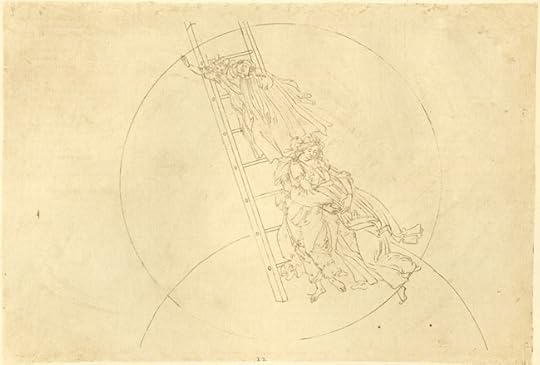
 (Clearer image:) http://www.worldofdante.org/media/ima...
(Clearer image:) http://www.worldofdante.org/media/ima...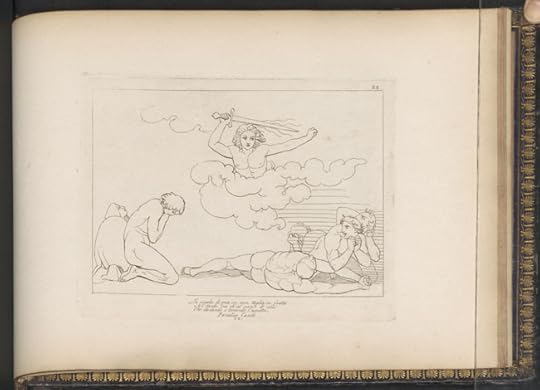
John Flaxman: Paradiso Canto XXII.16. “Sword of Divine Justice.” 1793. Engraving.
 For Paradiso Canto XXII image from the Bodleian Library 14th century manuscript try this:
For Paradiso Canto XXII image from the Bodleian Library 14th century manuscript try this:http://www.bodley.ox.ac.uk/dept/scwms...
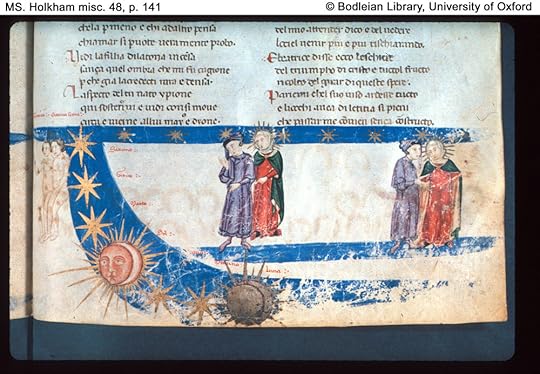
Paradiso Canto XXII. “Gemini; Dante and Beatrice Look Down at the Seven Planets; Dante and Beatrice Conversing.”
 http://etcweb.princeton.edu/dante/pdp...
http://etcweb.princeton.edu/dante/pdp...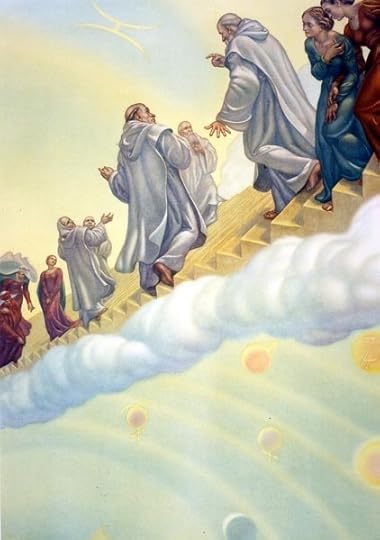
Amos Nattini: Paradiso Canto XXII. "Oppresso di stupore, a la mia guida 1923
 The ladder is a great image. In addition to Jacob's ladder, it brings to mind Diotima's ladder, and the ladder on Philosophy's dress in Boethius' Consolation.
The ladder is a great image. In addition to Jacob's ladder, it brings to mind Diotima's ladder, and the ladder on Philosophy's dress in Boethius' Consolation.But Dante reminds us of something that the artists seems to have overlooked (or ignored)-- the souls here do not have human form. They appear as spheres of light. Dante begs Benedict to show himself in his "uncovered shape," but he tells Dante that he must wait until the last sphere. (Which is not actually a sphere, since according to Benedict it does not exist in space.)
Heaven is a difficult place to depict.
 Thomas wrote: "The ladder is a great image. In addition to Jacob's ladder, it brings to mind Diotima's ladder, and the ladder on Philosophy's dress in Boethius' Consolation."
Thomas wrote: "The ladder is a great image. In addition to Jacob's ladder, it brings to mind Diotima's ladder, and the ladder on Philosophy's dress in Boethius' Consolation."Nice point. Would it be too pedestrian to note that even today we talk about climbing the ladder of success, as though that were the primary goal of our earthly lives? (Seems somewhat sad that we don't ever talk about climbing the ladder of knowledge in our journey of self-understanding, or climbing the ladder of love in our interpersonal relationships.)
But heights have always been associated with wisdom and the mystical. From Olympus and Parnassus to Mount Shasta and so many more, climbing up seems always to be seen as a valuable journey, even to the artist starving in his top floor garret. (Isn't it ironic that Victorian servants, perpetually climbing to the attics for their rest, were closer to God than their employers?)
But back to seriousness, yes, the ladder image is powerful (and maybe worth noting that Dante only needs a ladder because he is still mortal; all the immortals seem able to fly here and there at will, don't they?)
 The opening here, Dante seeing Beatrice as his mother, along with the next two cantos, seem to me to start bringing to completion the transformation in Dante's mind of Beatrice from the object of his earthly, carnal love to divine love, here the love of the mother for her child (one has to bring Mary and Christ into mind in these first stanzas, doesn't one?), and perhaps finishing the transformation in Canto 24.
The opening here, Dante seeing Beatrice as his mother, along with the next two cantos, seem to me to start bringing to completion the transformation in Dante's mind of Beatrice from the object of his earthly, carnal love to divine love, here the love of the mother for her child (one has to bring Mary and Christ into mind in these first stanzas, doesn't one?), and perhaps finishing the transformation in Canto 24.
 I'm confused by line 10-12, translated by Musa as
I'm confused by line 10-12, translated by Musa as Imagine had they sung or had I smiled,
what would have happened to you then, if now
you are so shaken by a single cry?
I understand that their singing might have overwhelmed him, but why would Beatrice's smile have shaken him much more powerfully than the thundering roar of the spirits?
 The criticism of contemporary (to Dante) Benedictine monks is so harsh I wonder how Dante got away with it. Were the Benedictines at the time in disfavor with the church? If now, how could Dante issue such a broad condemnation of them from the very lips of their founder and hope to evade the most severe censure from the Church?
The criticism of contemporary (to Dante) Benedictine monks is so harsh I wonder how Dante got away with it. Were the Benedictines at the time in disfavor with the church? If now, how could Dante issue such a broad condemnation of them from the very lips of their founder and hope to evade the most severe censure from the Church?
 One last point: as a fellow Gemini, I salute Dante's fulsome praise of being born under this auspicious sign! [g]
One last point: as a fellow Gemini, I salute Dante's fulsome praise of being born under this auspicious sign! [g]
 Everyman wrote: "The criticism of contemporary (to Dante) Benedictine monks is so harsh I wonder how Dante got away with it. Were the Benedictines at the time in disfavor with the church? If now, how could Dante ..."
Everyman wrote: "The criticism of contemporary (to Dante) Benedictine monks is so harsh I wonder how Dante got away with it. Were the Benedictines at the time in disfavor with the church? If now, how could Dante ..."After he put the reigning pope in Hell, I think Dante had little more to fear from outraged Benedictines.
 Everyman wrote: "The opening here, Dante seeing Beatrice as his mother, along with the next two cantos, seem to me to start bringing to completion the transformation in Dante's mind of Beatrice from the object of h..."
Everyman wrote: "The opening here, Dante seeing Beatrice as his mother, along with the next two cantos, seem to me to start bringing to completion the transformation in Dante's mind of Beatrice from the object of h..."Oh, good thought, Everyman!
 http://www.blakearchive.org/blake/ima...
http://www.blakearchive.org/blake/ima...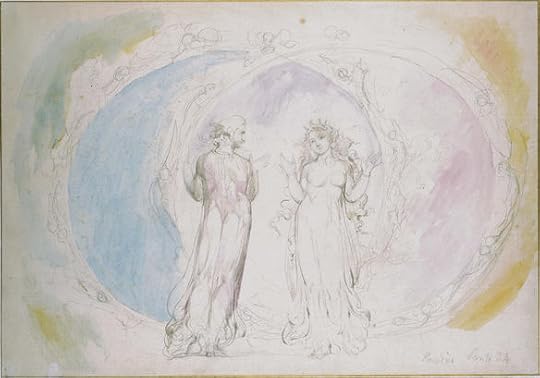
William Blake: Paradiso Canto XXII. "Dante and Beatrice in the Constellation of Gemini and the Sphere of Flame." c. 1824-27.
Not certain this one is associated with the right canto. Please do comment, especially if you see the linking text.
 Everyman wrote: "The opening here, Dante seeing Beatrice as his mother, along with the next two cantos, seem to me to start bringing to completion the transformation in Dante's mind of Beatrice from the object of h..."
Everyman wrote: "The opening here, Dante seeing Beatrice as his mother, along with the next two cantos, seem to me to start bringing to completion the transformation in Dante's mind of Beatrice from the object of h..."I like this image, it reminds me of a passage I can't quite recall of a child clinging to his mother's skirts and looking out upon the world (possibly Jude the Obscure ?):
"Overcome by wonder, I turned to my guide,
as does a child who always scurries back
to the one who has his utmost trust. (3)
"And she, like a mother, quick in comforting
her son when he is pale and out of breath
with a voice that often calmed him in the past, (6)
"said: ‘Don’t you understand you are in Heaven?'"
Dante (2012-07-18). Paradiso (Kindle Locations 9027-9042). Random House, Inc. Hollander Translation.
 "Then, from deep within, I heard him say: ‘Could you see,
"Then, from deep within, I heard him say: ‘Could you see,as I do, the charity burning in our midst,
you would have shared your thoughts with us. (33)
"‘And that your arrival at the lofty goal
be not delayed by waiting, I shall answer
your guarded thoughts, which you dare not express.'" (36)
Ibid. (Kindle Locations 9101-9114).
I am rather fascinated by these images, repeated over several cantos, of Dante's hesitations to speak and the willingness of the heavenly spirits to give. I am reminded of Matthew 7:8 -- be persistent in your asking and ye shall receive. (I am told the original language translates as asking repeatedly.) Yet, there is a humbleness Dante exhibits.
http://bible.oremus.org/?passage=Matt...

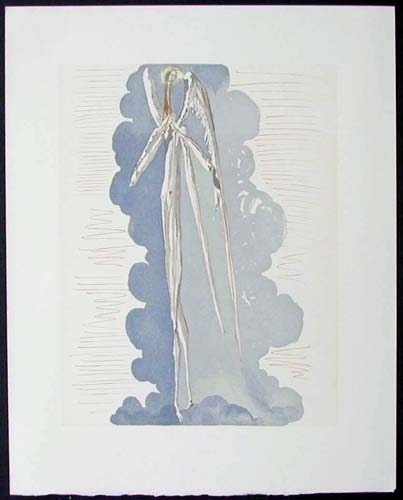


DANTE’S SENSES STILL REELING, he turns to Beatrice, who reassures him, and prophesies that he will live to see GOD’S VENGEANCE DESCEND ON THE CORRUPTORS OF THE CHURCH. She then calls his attention to the other souls of this sphere. Looking up, Dante sees A HUNDRED RADIANT GLOBES, one of which draws near and identifies itself as the heavenly splendor that had been ST. BENEDICT. Benedict explains that the Golden Ladder, like the contemplative life, soars to the summit of God’s glory, and he laments that so few of his Benedictine monks remain eager to put the world behind them and begin the ascent, for they are lost in the degeneracy of bad days. Yet God has worked greater wonders than would be required to restore the purity of the church. So saying, Benedict is gathered into his heavenly choir of radiances, and the whole company ascends to the top of the sky and out of sight. Beatrice then makes a sign and Dante feels himself making the ASCENT TO THE EIGHTH SPHERE, THE SPHERE OF THE FIXED STARS. But before the souls of that Sphere are revealed to him, Beatrice bids him look back to see how far she has raised him. Dante looks down through the Seven Spheres in their glory, seeing all the heavens at a glance, and the earth as an insignificant speck far below. Then turning from it as from a puny thing, he turns his eyes back to the eyes of Beatrice.
Reynolds/Sayers:
Dante’s bewilderment at the great cry of the contemplatives: At the conclusion of St Peter Damian’s words, a great cry of wrath goes forth from all the other souls. Dante, bewildered and terrified, turns to Beatrice for reassurance. Allegorically, his bewilderment signifies his (and possibly our) misunderstanding of the contemplative life. He had not expected that these souls would voice such vehement concern about the corruption of the monastic ideal on earth; but absorption in the vision of God does not detach the soul from zealous care for the life of the Church Militant.
The Heaven of the Fixed Stars: In the story, as Dante and Beatrice rise beyond the seventh and outermost of the planets, they enter the firmament or heaven of the fixed stars. This is the eighth and last of the astronomical spheres. The part of it which Dante enters is, appropriately, that which is constellated by Gemini, the stars under whose sign he was born. At this point, he retraces with his gaze (for it is endowed with supernatural acuity and power) the course he has taken through the seven planetary spheres, until it rests at last upon the puny semblance of our little globe. Allegorically, it is after passing through a period of spiritual contemplation (the Heaven of Saturn) that man can see the world in its true proportions.